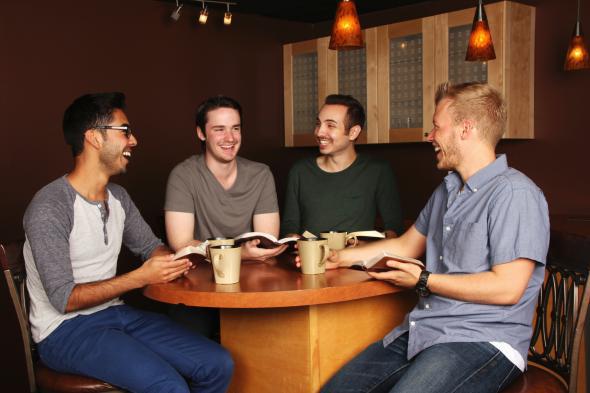On Wednesday, the editors of the New York Times’ Style section proved that they are not even trying to write creative headlines anymore. “Men Have Book Clubs, Too” is, on its surface, ambiguous: Do men have book clubs in addition to other things (elevated levels of testosterone, an indelible interest in grilling, control of all three branches of the federal government)? Or do men, in addition to women, have book clubs?
Unfortunately for those looking to read a complete accounting of men’s possessions, the latter interpretation is the correct one. Times writer Jennifer Miller profiles a number of men-only book clubs whose members want everyone to know that they’re extremely masculine, thank you very much. The 16-member Man Book Club in Marin County, Calif. abides by a cardinal rule: “No books by women about women.” The International Ultra Manly Book Club of Kansas City, Kan. consumes “manly—like, spicy” food and rates books “on a five-hand-grenade system for ‘manliness.’ ” Members of the Houston Men’s Book Club contend with false assumptions that they’re gay, while the actually gay founder of the NYC Gay Guys’ Book Club protects its grateful constituents from having to read “a 1,000-page book on lesbians who were persecuted in Russia.”
Most of the book club members quoted in the story seem pretty self-aware about the fact that they are men in a stereotypically female arena. The website for the International Ultra Manly Book Club—a deliberately over-the-top name—features pictures of Dwayne Johnson and Chuck Norris, two men whose cartoonishly macho images are never used unironically (on the internet, at least). But this being a Times trend piece, the male book club members’ self-deprecating and winking observations are presented in a totally deadpan manner, and so the article’s subjects come across as a little annoying. (Or, occasionally, a lot annoying: The Man Book Club’s founder snobbishly asserts, “We do not read so-called chick lit. The main character cannot be a woman.”) The article seems designed to stir up outrage on social media, and lo, that’s exactly what happened:
But do men who join men-only book clubs really deserve our scorn? Is it really so terrible for men to have safe spaces where they use literature as a lens through which to discuss society’s narrow expectations around masculinity, just as women have safe spaces to use literature as a lens through which to discuss society’s narrow expectations around femininity?
Most of the men who belong to the book clubs profiled in the Times article seem sensitive to the fact that women’s book clubs are often an opportunity for reflection and bonding over what it means to be a woman. “[Men] worry that, if they do join, they’ll be seen as intruding on a female activity or stigmatized as being the only guy,” says International Ultra Manly Book Club member John Creagar, who is correct that many women would not be happy if men started crashing their all-female book club meetings. We shouldn’t see all-male book clubs as a reactionary backlash against female book clubs, or an attempt to co-opt a traditionally female space, but as a way for men to enjoy the social and intellectual benefits of book clubs without destroying the homosocial camaraderie of all-female book clubs.
And men who deliberately take time to discuss literature with other men are subverting and challenging gender norms, no matter how jokily macho their book club names might be. “Fiction is designed to examine empathy,” says Houston Men’s Book Club member Edward Nawotka in the article, sounding for all the world like a gender studies professor. “Men aren’t encouraged to talk about their feelings or emotions in public.” Men who join book clubs are taking a small but important stand against repressive gender roles, a rebellion that every feminist should support.
Much of the eye-rolling in response to this article seems connected to other, larger issues: Most of the literature in the Western canon is by, and about, men, which means that girls grow up identifying with male protagonists but boys don’t grow up identifying with female protagonists. Men still write most book reviews, even though most readers are women. Novels by male authors are presumed to be literary fiction until proven otherwise, while books by female authors are presumed to be chick lit. These are serious and valid complaints about educational curricula, the media, and the publishing industry. But shaming men who read books about men and discuss them with other men isn’t going to fix any of these problems. Let’s grant men their book clubs, and look forward to that bright day when they’ll no longer feel the need to preen in their manliness when they talk about them.
